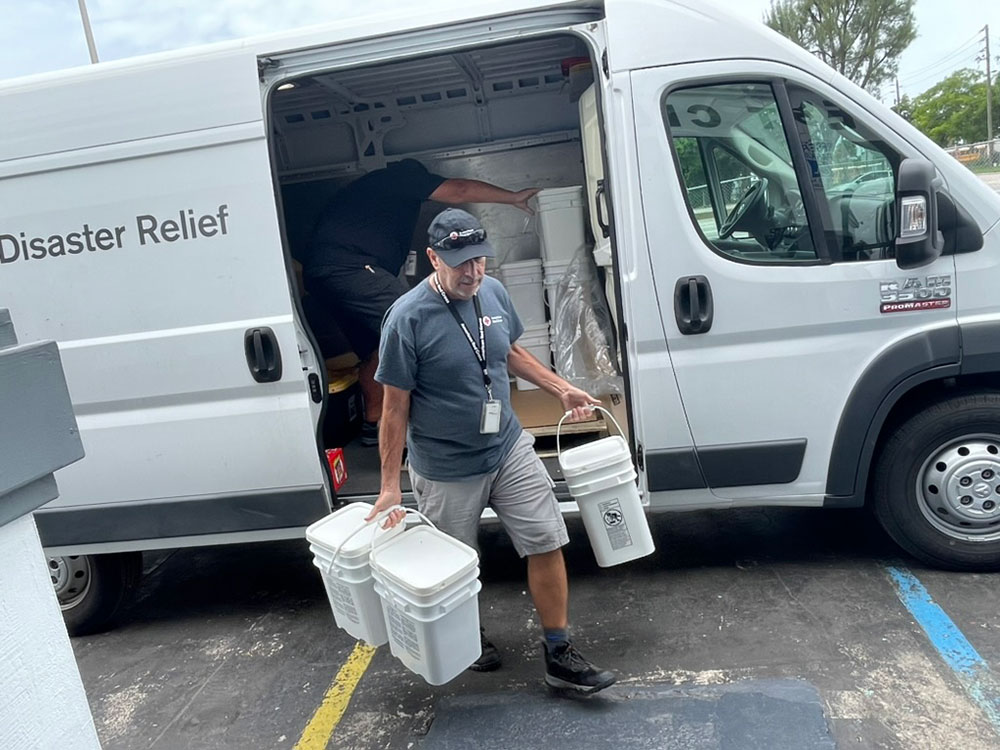The damage is done from the tropical depression that slammed into south Florida and dumped more than 20 inches of rain in three days. Now, the cleanup begins.
The American Red Cross has been distributing cleanup kits to residents trying to repair and mitigate flood damage. Cleanup can be daunting and dangerous. But if you follow these tips, you’ll reduce the chances of making a difficult situation worse.
Watch your water
Flooding can cause contaminated water to infiltrate your water supply. If you suspect your water has been compromised, do not use it to wash dishes, brush teeth, prepare food, wash hands, make ice, or make baby formula. Use bottled water until you’re sure the water in your house is safe.
Protect your pets
Any change of routine can make your pets anxious. Flooding is a particular danger because the places your pets are accustomed to going may be water soaked, weakened or contaminated. Leash or crate your pets until their home is safe for exploring, playing and sleeping. Launder pet beds that may have gotten wet. Supply bottled water until you’re sure your water supply is safe.
Check on neighbors
It takes a village to help your neighborhood to recover. Regularly check on friends, family, and neighbors who require special assistance -- children, older adults, those lacking transportation, large families who may need additional help in an emergency situation, people with disabilities and the people who care for them.
Watch out for unwanted critters
Floodwaters may bring into your house or yard dangerous critters. Keep your eye out for snakes and protect yourself from mosquitoes by covering arms and legs and using bug spray.
Avoid downed power lines
High winds can down power lines outside your home. Never approach a line, even if you think it’s without power. Do not step into puddles or standing water, which could conduct sparks and give you a shock or worse. Immediately report downed lines to your power company.
When in doubt, throw it out
Discard all food, beverages and medicine exposed to flood waters and mud. This includes canned goods, plastic utensils, baby bottle nipples and containers with food or liquid that has been sealed shut. Your refrigerator can keep food safe for up to four hours after the power has gone out. Keep the refrigerator door closed to preserve the cold.
Protect your skin
During cleanup, protect your skin and eyes by wearing long sleeves, long pants, rubber gloves and rubber boots. Use sunglasses or goggles to protect your eyes from harsh chemicals or contaminated water splatters.
Protect your back
Water-damaged furniture can be a lot heavier than it looks. Don’t lift heavy objects alone if you can avoid it. That’s what friends and family are for.
Pump gradually
Pump out flooded basements gradually (about one-third of the water per day) to avoid structural damage. If the water is pumped out completely in a short period of time, pressure from water-saturated soil on the outside could cause basement walls to collapse.
About the American Red Cross:
The American Red Cross shelters, feeds and provides comfort to victims of disasters; supplies about 40% of the nation’s blood; teaches skills that save lives; distributes international humanitarian aid; and supports veterans, military members and their families. The Red Cross is a nonprofit organization that depends on volunteers and the generosity of the American public to deliver its mission. For more information, please visit redcross.org or CruzRojaAmericana.org, or follow us on social media.






